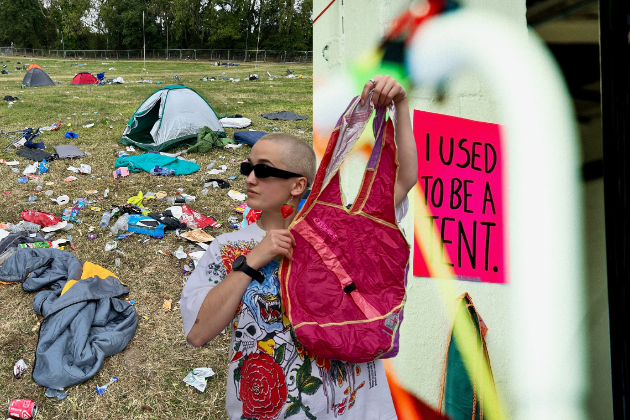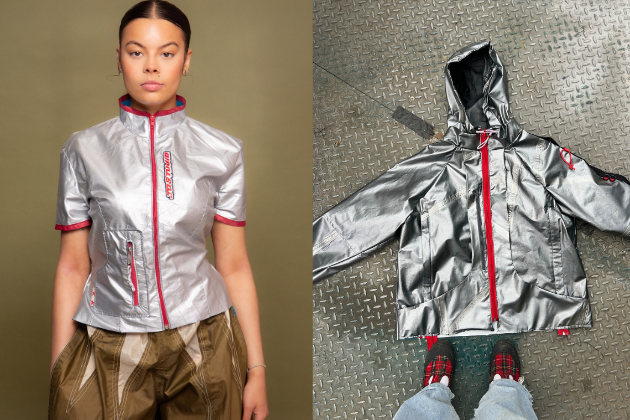Sustainability Series: J.O Studio’s journey from scraps to bold, eco-conscious fashion
Published 29th August 2025
From sewing to sustainability
J.O Studio, founded by Jess O’Riley, began with her love for sewing. For over a decade, Jess made her own clothes, using whatever scrap material was available for her projects. In many ways, her interest in sustainability originally sprang from sheer resourcefulness.
Her awareness of the climate crisis, particularly the environmental impact of textile production, grew over time. According to the UN Environment Programme, the fashion industry accounts for around 8% of global greenhouse gas emissions, most of which comes from processing raw materials. Jess developed an interest in environmentally friendly textiles early on, including during an EPQ in school where she created ‘leather’ from kombucha scobies. Growing up under education reforms that emphasised STEM over ‘soft’ subjects, she felt pressure to pursue academic success in a narrow sense. However, through a D&T GCSE and A-levels in art and costume design, Jess experienced the value of these often-sidelined subjects. Creativity and experimentation, alongside increasingly rare skills like woodworking and sewing, prove invaluable in developing innovative solutions to today’s critical challenges.
Discovering potential in the overlooked
Outside formal education, Jess’s experiences as a cyclist and runner shaped J.O Studio’s ethos. Before her final year in womenswear fashion at Manchester Fashion Institute, she took a year out. During a solo bikepacking trip across Scotland, she discovered a brand-new tent in a bin. Shocked by the wastage of a perfectly good tent, she strapped it to the back of her bike. This moment set her design ethos in motion, demonstrating how what some see as rubbish can hold tremendous potential.
Bringing the tent home highlighted a widespread issue: almost all of the estimated 250,000 tents left behind at UK festivals each year end up in landfill, despite assumptions that they are donated or recycled. Since this discovery, Jess has built relationships with major UK festivals and the charity Care4Calais to facilitate salvaging. After the labour-intensive process of washing, drying, and sorting, the studio transforms these discarded tents into a mass of colourful fabric for garments.

Bold design from reclaimed materials
Working with tents presents challenges, as no two are alike, but this uniqueness makes them an intriguing source material. Each garment repurposes distinctive details, such as zips and toggles, in a new way. J.O Studio challenges the misconception that sustainable fashion is beige or boring, instead producing bold, colourful designs. As an urban hiker in Manchester, Jess creates pieces that seamlessly transition between city life and the outdoors. Modular design principles allow garments to be adapted, with removable and attachable elements transforming pieces for different uses. For example, a quilted vest suitable for a night out on Saturday can become the ideal accompaniment for a hike in the Peaks on Sunday.

Building a sustainable business ethos
Running a brand has proven to Jess to be as much about networking as designing. She has spoken on panels at events such as Graduate Fashion Week to discuss sustainable fashion. Jess emphasises that sustainability cannot simply be treated as a lifestyle choice but requires a collective shift towards buying less and making products last. As part of J.O Studio’s ethos, free mending is offered to all customers to ensure the longevity of garments.
Looking ahead, Jess aims to expand the studio into larger projects to further reduce waste. Salvaging can only recover a fraction of discarded tents, with the remainder destined for landfill. J.O Studio seeks to raise awareness and translate online momentum into sustained, successful policy change.
Supporting northern creativity
Jess is committed to nurturing a network of northern-based creatives. Many talented individuals working outside London lack opportunities for recognition. In response, she recently launched a micro-factory in Manchester with two other designers (@making_roommcr), creating a space for local, transparent production that enables scaling without compromising ethical commitments.
Rethinking waste: design solutions for a cleaner environment
The ‘Inspired by Industry’ JCB context challenges students to explore the causes and effects of pollution and design solutions that reduce environmental impact. Activities can range from conceptual ideas to small-scale prototypes, such as waste collection or compaction systems.
The context encourages critical thinking about sustainability, resource management, and the wider impact of design. By experimenting with practical solutions, students develop skills in problem-solving, innovation, and environmentally responsible design.
‘Inspired by Industry’ is FREE for all teachers to use, with additional member-only Tasks and Activities available to Design & Technology Association members for deeper classroom engagement.
Back to News


